Unit 5 Good manners 期末复习要点讲义+巩固测试(含答案)
文档属性
| 名称 | Unit 5 Good manners 期末复习要点讲义+巩固测试(含答案) | 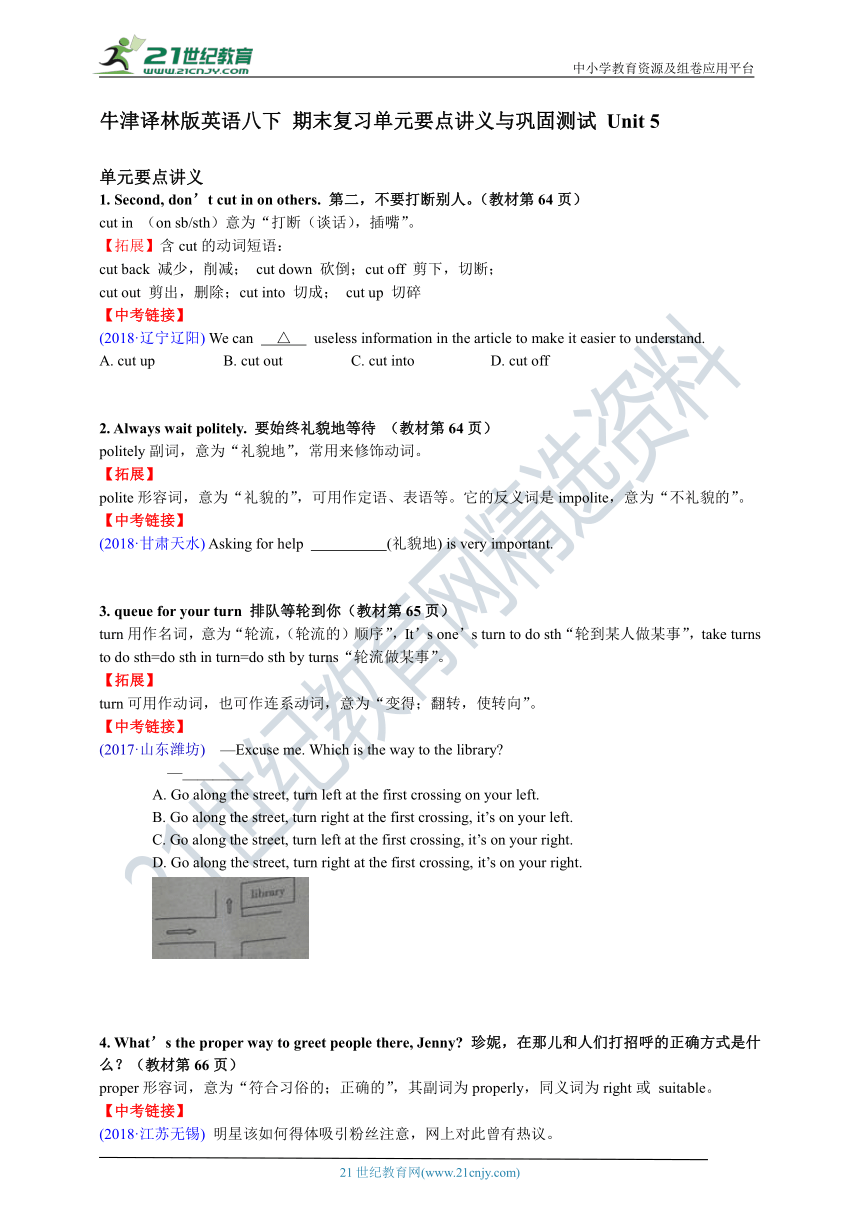 | |
| 格式 | zip | ||
| 文件大小 | 1.3MB | ||
| 资源类型 | 试卷 | ||
| 版本资源 | 牛津译林版 | ||
| 科目 | 英语 | ||
| 更新时间 | 2019-05-15 21:41:24 | ||
图片预览

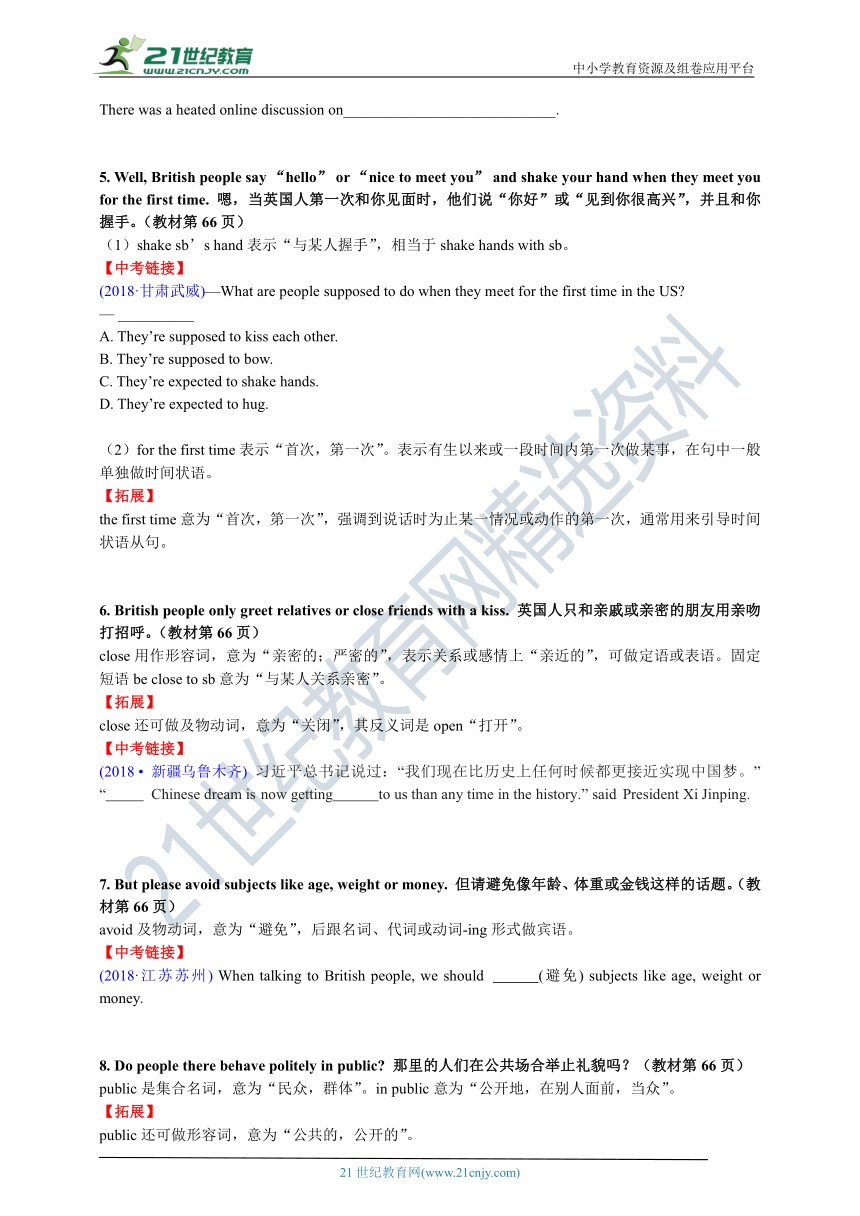
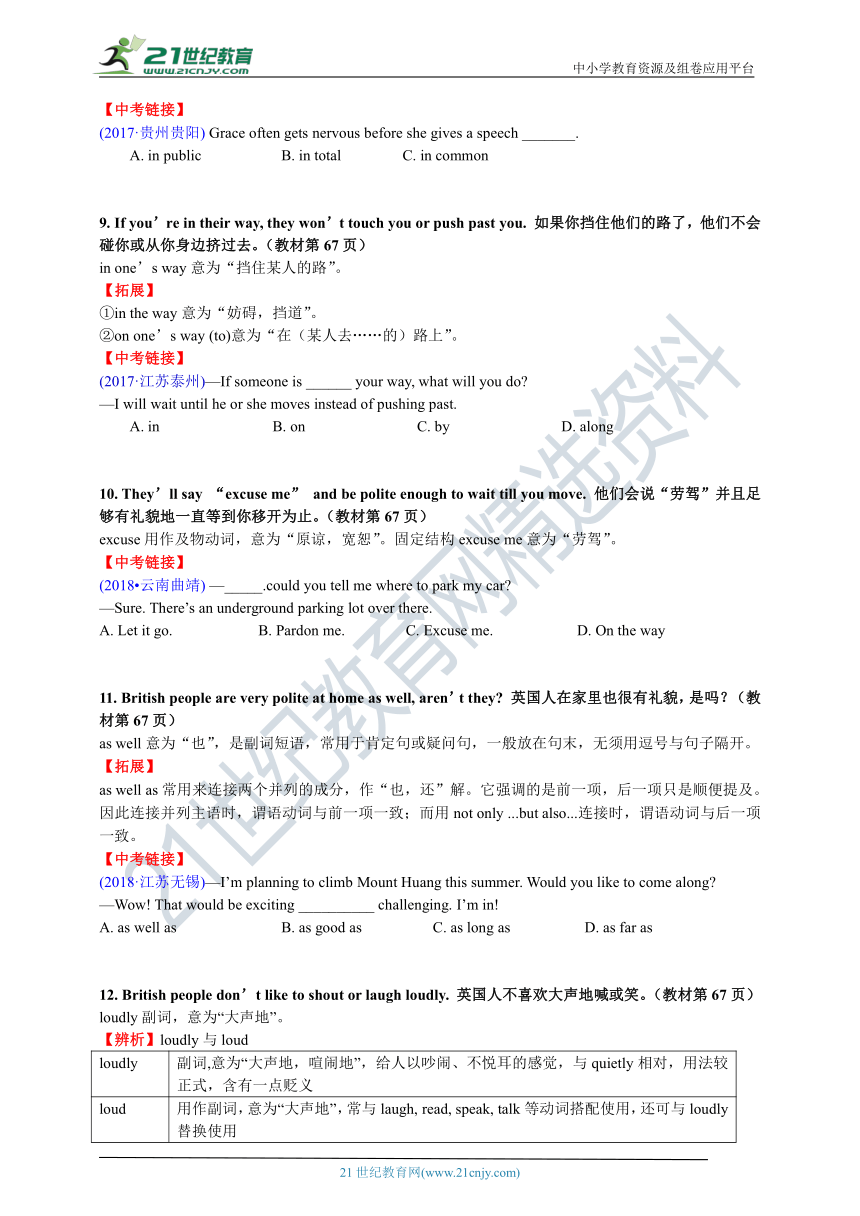
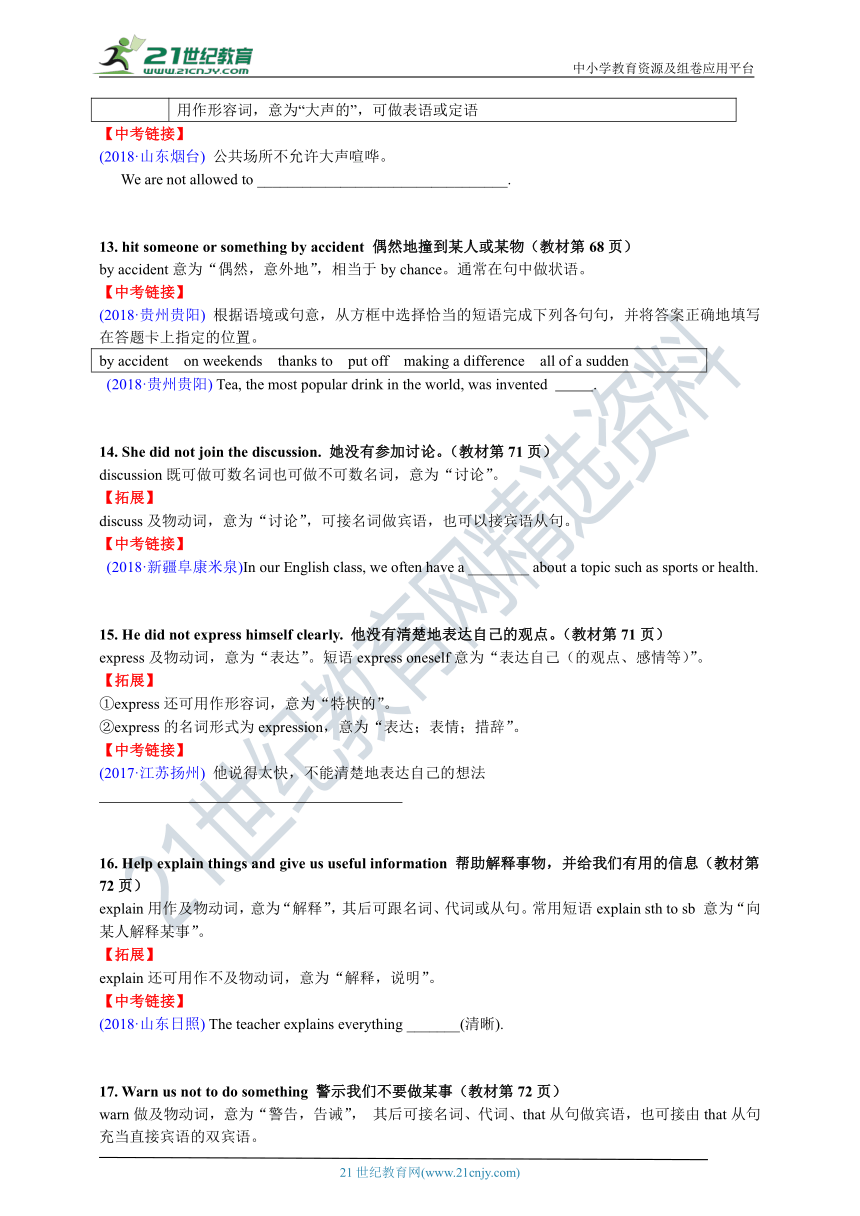
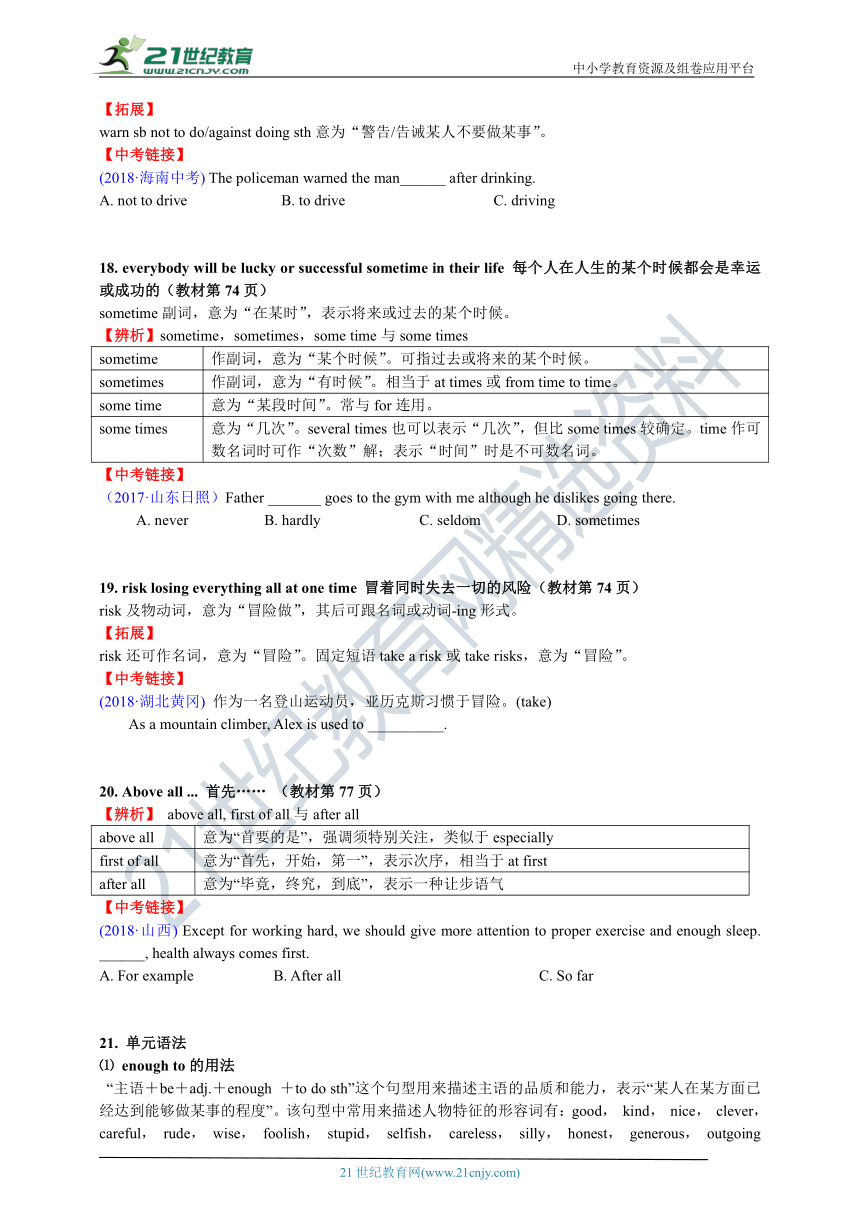
文档简介
中小学教育资源及组卷应用平台
牛津译林版英语八下 期末复习单元要点讲义与巩固测试 Unit 5
单元要点讲义
1. Second, don’t cut in on others. 第二,不要打断别人。(教材第64页)
cut in (on sb/sth)意为“打断(谈话),插嘴”。
【拓展】含cut的动词短语:
cut back 减少,削减; cut down 砍倒;cut off 剪下,切断;
cut out 剪出,删除;cut into 切成; cut up 切碎
【中考链接】
(2018·辽宁辽阳) We can △ useless information in the article to make it easier to understand.
A. cut up B. cut out C. cut into D. cut off
2. Always wait politely. 要始终礼貌地等待 (教材第64页)
politely副词,意为“礼貌地”,常用来修饰动词。
【拓展】
polite形容词,意为“礼貌的”,可用作定语、表语等。它的反义词是impolite,意为“不礼貌的”。
【中考链接】
(2018·甘肃天水) Asking for help (礼貌地) is very important.
3. queue for your turn 排队等轮到你(教材第65页)
turn用作名词,意为“轮流,(轮流的)顺序”,It’s one’s turn to do sth“轮到某人做某事”,take turns to do sth=do sth in turn=do sth by turns“轮流做某事”。
【拓展】
turn可用作动词,也可作连系动词,意为“变得;翻转,使转向”。
【中考链接】
(2017·山东潍坊) —Excuse me. Which is the way to the library?
—________
A. Go along the street, turn left at the first crossing on your left.
B. Go along the street, turn right at the first crossing, it’s on your left.
C. Go along the street, turn left at the first crossing, it’s on your right.
D. Go along the street, turn right at the first crossing, it’s on your right.
4. What’s the proper way to greet people there, Jenny? 珍妮,在那儿和人们打招呼的正确方式是什么?(教材第66页)
proper形容词,意为“符合习俗的;正确的”,其副词为properly,同义词为right或 suitable。
【中考链接】
(2018·江苏无锡) 明星该如何得体吸引粉丝注意,网上对此曾有热议。
There was a heated online discussion on____________________________.
5. Well, British people say “hello” or “nice to meet you” and shake your hand when they meet you for the first time. 嗯,当英国人第一次和你见面时,他们说“你好”或“见到你很高兴”,并且和你握手。(教材第66页)
(1)shake sb’s hand表示“与某人握手”,相当于shake hands with sb。
【中考链接】
(2018·甘肃武威)—What are people supposed to do when they meet for the first time in the US?
— __________
A. They’re supposed to kiss each other.
B. They’re supposed to bow.
C. They’re expected to shake hands.
D. They’re expected to hug.
(2)for the first time表示“首次,第一次”。表示有生以来或一段时间内第一次做某事,在句中一般单独做时间状语。
【拓展】
the first time意为“首次,第一次”,强调到说话时为止某一情况或动作的第一次,通常用来引导时间状语从句。
6. British people only greet relatives or close friends with a kiss. 英国人只和亲戚或亲密的朋友用亲吻打招呼。(教材第66页)
close用作形容词,意为“亲密的;严密的”,表示关系或感情上“亲近的”,可做定语或表语。固定短语be close to sb意为“与某人关系亲密”。
【拓展】
close还可做及物动词,意为“关闭”,其反义词是open“打开”。
【中考链接】
(2018 ? 新疆乌鲁木齐) 习近平总书记说过:“我们现在比历史上任何时候都更接近实现中国梦。”
“ Chinese dream is now getting to us than any time in the history.” said President Xi Jinping.
7. But please avoid subjects like age, weight or money. 但请避免像年龄、体重或金钱这样的话题。(教材第66页)
avoid及物动词,意为“避免”,后跟名词、代词或动词-ing形式做宾语。
【中考链接】
(2018·江苏苏州) When talking to British people, we should (避免) subjects like age, weight or money.
8. Do people there behave politely in public? 那里的人们在公共场合举止礼貌吗?(教材第66页)
public是集合名词,意为“民众,群体”。in public意为“公开地,在别人面前,当众”。
【拓展】
public还可做形容词,意为“公共的,公开的”。
【中考链接】
(2017·贵州贵阳) Grace often gets nervous before she gives a speech _______.
A. in public B. in total C. in common
9. If you’re in their way, they won’t touch you or push past you. 如果你挡住他们的路了,他们不会碰你或从你身边挤过去。(教材第67页)
in one’s way意为“挡住某人的路”。
【拓展】
①in the way意为“妨碍,挡道”。
②on one’s way (to)意为“在(某人去……的)路上”。
【中考链接】
(2017·江苏泰州)—If someone is ______ your way, what will you do?
—I will wait until he or she moves instead of pushing past.
A. in B. on C. by D. along
10. They’ll say “excuse me” and be polite enough to wait till you move. 他们会说“劳驾”并且足够有礼貌地一直等到你移开为止。(教材第67页)
excuse用作及物动词,意为“原谅,宽恕”。固定结构excuse me意为“劳驾”。
【中考链接】
(2018?云南曲靖) —_____.could you tell me where to park my car?
—Sure. There’s an underground parking lot over there.
A. Let it go. B. Pardon me. C. Excuse me. D. On the way
11. British people are very polite at home as well, aren’t they? 英国人在家里也很有礼貌,是吗?(教材第67页)
as well意为“也”,是副词短语,常用于肯定句或疑问句,一般放在句末,无须用逗号与句子隔开。
【拓展】
as well as常用来连接两个并列的成分,作“也,还”解。它强调的是前一项,后一项只是顺便提及。因此连接并列主语时,谓语动词与前一项一致;而用not only ...but also...连接时,谓语动词与后一项一致。
【中考链接】
(2018·江苏无锡)—I’m planning to climb Mount Huang this summer. Would you like to come along?
—Wow! That would be exciting __________ challenging. I’m in!
A. as well as B. as good as C. as long as D. as far as
12. British people don’t like to shout or laugh loudly. 英国人不喜欢大声地喊或笑。(教材第67页)loudly副词,意为“大声地”。
【辨析】loudly与loud
loudly 副词,意为“大声地,喧闹地”,给人以吵闹、不悦耳的感觉,与quietly相对,用法较正式,含有一点贬义
loud 用作副词,意为“大声地”,常与laugh, read, speak, talk等动词搭配使用,还可与loudly替换使用
用作形容词,意为“大声的”,可做表语或定语
【中考链接】
(2018·山东烟台) 公共场所不允许大声喧哗。
We are not allowed to _________________________________.
13. hit someone or something by accident 偶然地撞到某人或某物(教材第68页)
by accident意为“偶然,意外地”,相当于by chance。通常在句中做状语。
【中考链接】
(2018·贵州贵阳) 根据语境或句意,从方框中选择恰当的短语完成下列各句句,并将答案正确地填写在答题卡上指定的位置。
by accident on weekends thanks to put off making a difference all of a sudden
(2018·贵州贵阳) Tea, the most popular drink in the world, was invented .
14. She did not join the discussion. 她没有参加讨论。(教材第71页)
discussion既可做可数名词也可做不可数名词,意为“讨论”。
【拓展】
discuss及物动词,意为“讨论”,可接名词做宾语,也可以接宾语从句。
【中考链接】
(2018·新疆阜康米泉)In our English class, we often have a ________ about a topic such as sports or health.
15. He did not express himself clearly. 他没有清楚地表达自己的观点。(教材第71页)
express及物动词,意为“表达”。短语express oneself意为“表达自己(的观点、感情等)”。
【拓展】
①express还可用作形容词,意为“特快的”。
②express的名词形式为expression,意为“表达;表情;措辞”。
【中考链接】
(2017·江苏扬州) 他说得太快,不能清楚地表达自己的想法
16. Help explain things and give us useful information 帮助解释事物,并给我们有用的信息(教材第72页)
explain用作及物动词,意为“解释”,其后可跟名词、代词或从句。常用短语explain sth to sb 意为“向某人解释某事”。
【拓展】
explain还可用作不及物动词,意为“解释,说明”。
【中考链接】
(2018·山东日照) The teacher explains everything _______(清晰).
17. Warn us not to do something 警示我们不要做某事(教材第72页)
warn做及物动词,意为“警告,告诫”, 其后可接名词、代词、that从句做宾语,也可接由that从句充当直接宾语的双宾语。
【拓展】
warn sb not to do/against doing sth意为“警告/告诫某人不要做某事”。
【中考链接】
(2018·海南中考) The policeman warned the man______ after drinking.
A. not to drive B. to drive C. driving
18. everybody will be lucky or successful sometime in their life 每个人在人生的某个时候都会是幸运或成功的(教材第74页)
sometime副词,意为“在某时”,表示将来或过去的某个时候。
【辨析】sometime,sometimes,some time与some times
sometime 作副词,意为“某个时候”。可指过去或将来的某个时候。
sometimes 作副词,意为“有时候”。相当于at times或from time to time。
some time 意为“某段时间”。常与for连用。
some times 意为“几次”。several times也可以表示“几次”,但比some times较确定。time作可数名词时可作“次数”解;表示“时间”时是不可数名词。
【中考链接】
(2017·山东日照)Father _______ goes to the gym with me although he dislikes going there.
A. never B. hardly C. seldom D. sometimes
19. risk losing everything all at one time 冒着同时失去一切的风险(教材第74页)
risk及物动词,意为“冒险做”,其后可跟名词或动词-ing形式。
【拓展】
risk还可作名词,意为“冒险”。固定短语take a risk或take risks,意为“冒险”。
【中考链接】
(2018·湖北黄冈) 作为一名登山运动员,亚历克斯习惯于冒险。(take)
As a mountain climber, Alex is used to __________.
20. Above all ... 首先…… (教材第77页)
【辨析】 above all, first of all与after all
above all 意为“首要的是”,强调须特别关注,类似于especially
first of all 意为“首先,开始,第一”,表示次序,相当于at first
after all 意为“毕竟,终究,到底”,表示一种让步语气
【中考链接】
(2018·山西) Except for working hard, we should give more attention to proper exercise and enough sleep. ______, health always comes first.
A. For example B. After all C. So far
21. 单元语法
⑴ enough to的用法
“主语+be+adj.+enough +to do sth”这个句型用来描述主语的品质和能力,表示“某人在某方面已经达到能够做某事的程度”。该句型中常用来描述人物特征的形容词有:good, kind, nice, clever, careful, rude, wise, foolish, stupid, selfish, careless, silly, honest, generous, outgoing等。
【注意】
A. 在使用该句型的时候,要注意主语和be动词的一致性。形容词前没有诸如very, quite之类的修饰词。
B. enough是副词,修饰前面的形容词,在句中做状语,位置在被修饰词的后面。
【拓展】
enough还可以用作形容词,可在句中做定语和表语。
C. 此句型可以和so ... that ... 的肯定式互换。
【中考链接】
(2018·甘肃天水) His joke is to make us all .
A.enough funny, laugh B.funny enough, laugh
C.enough funny, to laugh D.funny enough, to laugh
⑵ too ... to的用法
A. “too+adj./adv.+to do”结构简称为“too ... to”结构。在大多数情况下表达一个否定的结果,通常可译为“太……而不能……;太……无法……”。其构成的常用句型有两种:
⑴ too+adj./ adv.+to do这个句型是too ... to的最基本句型。too后接形容词或副词
⑵ too+adj./ adv.+for sb/ sth+to do此结构中加上一个for sb/sth,以引出动词不定式的逻辑主语,可以起到一定的限制作用,即限制不定式所表示的行为动作只是就它的逻辑主语而言的,对于其他人或物则不一定是这样,这就使句子意思更具体、明确。
【注意】
在使用too+adj./adv.+for sb/sth+to do这个句型时要注意当句子主语和不定式的宾语是指同一个事物时,宾语不能重复,必须省掉,有时甚至其后的to do也可以省去。
B. too ... to结构之前带有but, only, all, never, not时,是强调肯定的表达法,译作“非常……”“十分……”“实在……”“真是太……”等。
C. “too+adj.+to do”句型可与“so ... that ...”的否定式或“not+adj.+enough+to do(该结构中的形容词与too ... to结构中的形容词为反义词)”转换。
【中考链接】
完成句子:
(2018·甘肃武威) 改过不嫌晚。
It’s never __________ late __________ mend.
Unit 5 单元要点讲义 答案与解析
1. B考查动词短语辨析。句意:我们可以删除文章中无用的信息,让它更容易理解。cut up切碎,cut out删除,删去; cut…into… 把……切成……;cut off切除。结合句意可知,故选B。
2. politely 句意:礼貌地求助时非常重要的。此处用副词politely修饰动词短语ask for help。故答案为politely。
3. C 考查图示和指路用语。结合图示,可知是向左拐,图书馆在右边。故选C。
4. how stars should attract/catch/draw the attention of fans properly.
5(1)C考查风俗习惯。句意:——在美国人们第一次见面应该做什么?——_________.美国人第一次见面应该是握手。故选C。
6. Achieving/Realizing/Reaching, closer
7. avoid 句意:与英国人交谈时,我们应避免诸如年龄、体重或金钱的话题。should是情态动词,其后应接动词原形,“避免”应为avoid。故答案为avoid。
8.?A? 考查介词短语辨析。句意:Grace常在公众场合演讲前变得很紧张。In?public在公众场合;in?total总共;in?common共同的,共有的。由空格前get?nervous可推知,空格处指“在公共场合”所有了前面的紧张。故选A。
9.A 考查介词。句意:——如果有人挡了你的路,你会怎么做?——我会等到他或她走过去而不是抢道。答语意义提示上文用in one’s way表示“挡道”。故选A。
10. C 考查交际用语。Let it go意为“放手吧”;Pardon me意为“请再说一遍”;Excuse me意为“打扰一下”;on the way意为“沿途”。句意:—打扰一下,你能告诉我把车停在哪里吗?—当然。那边有个地下停车场。故选C。
11. A 考查连接词组辨析。句意:——我计划这个夏天爬黄山,你想要更我一起去吗? ——那不仅令人兴奋,而且很有挑战性。我参加。A:和,不仅…而且…;B:和…一样好;C:和…一样长,只要;D:远到,直到。分析四个选项可知“不仅…而且…”符合句意。故选A。
12. speak loudly in public 本题考查be (not) allowed to do sth。由句意及所给句子可知设空处应表示“在公众场所大声喧哗”,speak loudly意为“大声讲话”,in public 意为“在公共场所”。
13. by accident。句意:世界上最受欢迎的饮料——茶,是被偶然创造出来的。根据句意应该用by accident。
14. discussion 句意:在我们的英语课上,我们经常讨论一个话题,例如运动或健康。have a discussion“讨论”。
15. He spoke so fast that he can’t express himself clearly./ He spoke too fast to express himself clearly.
16. clearly 句意:老师经常清晰地解释每件事情。本题考查副词修饰行为动词,表示“明确地,清晰地”,应用clearly。故答案是clearly。
17. A 考查固定搭配。warn sb. (not)to do sth.“警告某人(不要)做某事”。根据常识酒后不能驾驶,所以此处应该是warn sb. not to do sth. 结构。故选A。
18. D 考查副词用法辨析。句意:尽管父亲不喜欢去体育馆,但是他有时去那里。never意为“从来不”hardly“几乎不”;seldom“很少”;sometimes“有时”。选项A,B和C都表示否定;只有选项D表示肯定。句中的although表示转折,由dislike可知主句要用肯定形式。故选D。
19. taking risks/ taking a risk
20. B 考查介词短语。句意:除了努力工作以外,我们应该更加关注适当的锻炼和足够的睡眠。毕竟,健康总是第一位的。for example例如;after all毕竟;so far到目前为止。根据句意可知选 B。
21 ⑴ B考查副词的用法和非谓语动词的用法。句意:他的笑话足够搞笑,惹得我们都大笑起来。enough 在这里用作副词,意为“足够地”,可修饰形容词或副词,要放在所修饰的形容词或副词之后,故第一个空格用funny enough。使役动词make后跟不定式作宾语补足语要省去不定式符号to,即make sb. do sth.意为“让某人做某事”,故第二个空格用laugh。 故选B。
21 ⑵ too; to
Unit 5 巩固测试
一、单项选择
1. —Would you please not speak so loudly in ________ public?
—Sorry. I will remember to speak in ________ lower voice.
A. the; a B. /; a C. the; the D. /; /
2. It’s rude to push _____before others, so you should queue _____your turn.
A. in; to B.?/; to C.?in; for ? D.?/; /
3. Daniel’s mother always tells him to do ________ she does.
A. like B. as C. with D. for
4. _______, you can improve your maths day by day.
A. In this way B. On the way C. By the way D. To this way
5. —Mum, I think I’m ________ to get back to school.
—Not really, my dear, you’d better stay at home for ______ days.
A. so well; another two B. so good; another two
C. well enough; two more D. good enough; other two
6. Check your answer to _______each of them is correct after finishing your exercises .
A. make sure B. make out C. make up D. make from
7. Where is my watch? I put it in my bag __________ yesterday.
A. sometimes B. some time C. sometime D. some times
8.Lily was ________ surprised ________ say anything when she heard the news.
A. so, that B. enough to C. too, to D. too, that
9.—Would you mind me _______ my car here?
—_______. Look at the sign. It says “No Parking”.
A. parking; Of course not B. to park; Of course not
C. parking; Better not D. to park; You’d better
10. — How surprising! Harry finally won the first prize in the guessing game.
—Really? .
A. Many hands make light work. B. Every dog has its day.
C. Burn the candle at both ends D. It never rains but it pours.
二、完形填空
(2018?四川泸州)B篇
A boy was one day sitting on the steps of a door. He had a stick in one hand. 1 in the other hand a large piece of bread and butter, which somebody had kindly give him. While he was eating it and singing a song happily, he saw a poor little dog quietly 2 not far from him. He called out to it, “Come here, poor dog!”
Hearing this, the dog woke up, rose with its ears 3 and wagged(摇摆) its tail. Seeing the boy eating, it came near him. The boy held out to it piece of his bread and butter. As the dog Stretched(伸出) out its head to take the 4 ,the boy quickly drew back his hand and hit it 5 on the nose. The poor dog ran away, 6 loudly, while the cruel boy sat, laughing at the trick he had done.
A gentleman, who was looking from a window on the other side of street, saw what the 7 boy had done. Opening the street door, he called him to 8 over, at the same time 9 up one dollar between the finger and thumb(大拇指).
“Would you like this?” said the gentleman.
“Yes, if you 10 , sir,” said the boy, smiling, and he quickly ran over to seize(抓) the 11 .
Just as the boy stretched out his hand, the gentleman hit 12 on the knee with an umbrella. “Why did you do that?” shouted the boy angrily. He made a very 13 face and cried, “I didn’t hurt you, nor ask you for money.”
“ 14 did you hurt that poor dog just now?” said the gentleman. “He didn’t hurt you, nor ask you for bread and butter. As you served it I have served you. Now, remember it can feel as well as you, and learn to behave 15 towards animals in future.”
1. A. or B. if C. and D. off
2. A. sleeping B. running C. jumping D. dancing
3. A. down B. up C. off D. through
4. A. food B. hand C. boy D. door
5. A. gently B. slowly C. hardly D. hard
6. A. speaking B. laughing C. crying D. singing
7. A. cruel B. kind C. polite D. honest
8. A. go B. turn C. climb D. cross
9. A. picking B. holding C. putting D. getting
10. A. lend B. know C. please D. ask
11. A. finger B. bread C. butter D. money
12. A. himself B. him C. it D. itself
13. A. warm B. shy C. long D. sweet
14. A. Why B. When C. What D. Where
15. A. terribly B. luckily C. badly D. kindly
三、阅读理解
B(2018·广西百色)
Table manners are about how to behave when you eat a meal. Different countries have different table manners. Now let’s see some table manners in the following countries.
Japan
It is OK to make some noises when you eat noodles in Japan. Making some noises is not rude but is praise to the cook. The Japanese also say it tastes better if you make some noises while eating.
What else to watch: it’s important to say “Thanks” before and after a meal.
France
In France, a meal is like a ceremony. People enjoy it and make it a special event. You should never discuss money over dinner. And going Dutch(各自付费) is not polite.
What else to watch: you need to finish everything on your plate.
Mexico
In Mexico, whenever you catch the eye of someone who’s eating, even a stranger, it’s good manners to say “provecho”, which means “enjoy”.
What else to watch: where you sit is important in this country. Before you get seated, look for place cards, or wait until the host seats you. And you must say “Enjoy your meal” before you leave the table.
根据短文内容, 选出最佳选项。
1. What’s the polite way to eat noodles in Japan?
A. Eating quietly. B. Eating quickly.
C. Leaving some. D. Making some noises.
2. What don’t people like to talk about over dinner in France?
A. Money. B. Weather. C. Sports. D. News.
3. What should you say before you leave the table in Mexico?
A. Goodbye. B. Enjoy your meal. C. Thank you. D. The food is delicious.
4. Which of the following is TRUE?
A. The Japanese always eat quietly.
B. People in France like going Dutch when eating out.
C. Where you sit is important in Mexico.
D. Strangers never talk to the people who are eating in Mexico.
5. This passage is mainly about __________.
A. sports stars B. dinner parties C. eating habits D. table manners
四、词汇
A. 根据句意及汉语提示,拼写单词
1. Speak slowly and practise _______ (表达)yourselves clearly.
2. We _______ (摘) two baskets of apples already. Let’s go and have a rest.
3. Please listen to the _______ (非正式谈话)and tell me what they are about .
4. Among the _______ (客人) were Jerry Brown and Elihu Harris
5. After finishing the paper, we should check carefully to _______ (避免) mistakes.
B. 用所给词的适当形式填空
6. Don’t leave the tap _______ (run) while brushing your teeth.
7. I have some trouble _______ (explain) the difficult sentences to you.
8. If you can work _______ (close) with him, I’m sure you will win first prize.
9. —Look at the sign. It is “no photos” here. —Oh, sorry. I _______ (not see) that.
10. His father is so _______ (success) a businessman that many of his products sell well.
五、任务型阅读
For children, the first day of school is their first step into a new world. This important day can be made special by planning some interesting activities. For example, you can ask each of the students to introduce themselves in a unique way. Appreciate (欣赏) the good ideas that the children have for describing themselves.
It’s also a good idea to organize “silent learning”. In this activity, you need to supply paper and color to each of your students. Ask them to draw anything that is interesting to them. To make it special, you can ask them to draw something in particular. To make it interesting, you can give it the name of a human emotion (情感) and ask them to describe it in their own words.
Also you can tell your students everything about the school. You can tell them some of your experiences in this school. You can write down your experiences and that can be made up into an interesting story. You can take this chance to encourage the children to take part in all the school activities. You can make use of this chance to help the students get rid of (消除) their little fears about the new school. You can give the students a chance to ask questions and share their views.
Getting the students together to decorate (装饰) the classroom is also a good activity for the first day of school. You can join them in this activity and help them. Let the students come up with ideas for decorating the classroom; allow them to use their imagination in the decoration and make the classroom look nice.
All the above activities for the first day of school can make the students feel comfortable in the new school and give them some moments that they will remember for long years.
____1___ for the first day of school Supporting details
Make a self-introduction ●Ask each student to _____2themselves in a unique way. ●Appreciate the children’s good ideas for describing themselves.
Organize “silent learning” ●Give the students paper and color to draw what they are____3in. ●Ask the students to ___4something in particular. ●Ask the students to use their own words to describe the paintings.
Know everything about the school ●_5. some of your experiences with the students. ● ____6. up an interesting story according to your experiences. ●Encourage the children to take part in all the school activities. ●Help the students get rid of their little fears about the new school. ●Give the students a ___7to ask questions.
_8.the classroom ●Come to __9.the students in the decoration. ●Allow them to use their imagination in the decoration and make the classroom look nice.
All that the teachers do probably make the students never ____10.their first day at school.
六、短文填空
Indians always shake their heads when they talk to others.It does not have the same meaning as our “No”.If someone wants to visit India,he should know this or it will give him some t____1____.
One day,a foreign officer went to India on b___2___.He hired(雇用)a car and an Indian driver.When he told his driver to take him to his office,the driver shook his head at once.The officer r____3____his order and the driver shook his head a____4____.At last,the officer,of course,got a____5____.
“How dare(敢)you r___6___ my order?”he shouted,“Drive me to the office at once!”
The driver answered in a very loud v____7____ too.“Yes,sir.” But to the officer’s surprise ,the driver shook his head at the s____8____ time.
The car started and the officer was now surprised that he couldn’t s____9____ a word.He thought about it for a while and nodded with a smile,“ ‘No’ m____10____ ‘Yes’ here!”
1. t__________ 2. b__________ 3. r__________ 4. a__________ 5. a__________
6. r__________ 7. v__________ 8. s__________ 9. s__________ 10. m_________
七、书面表达
(2018·辽宁沈阳)英国作家萨克雷曾说:“播种习惯收获性格,播种性格收获命运。”在生活中,一定有好的习惯伴随你的成长。请你以Good habits make me 为题写一篇短文(词数80~100)。步骤与要点如下:
1.确定主题,并在文中说明原因;
2.围绕主题,进行叙述;
3.写出具体计划,也可以讲述一段与主题有关的故事或经历。
要求:
1.补全标题(参考词汇:better, happier, healthier, stronger等);
2.字迹工整,内容完整连贯,语言准确规范;
3.鼓励写出真情实感,对紧扣主题的适当发挥不予扣分。短文的开头已给出,不计入词数;
4.作文中可以写出具体计划内容,也可以使用亲身经历或虚构的故事,但要注意时态的运用;如果参照短文中的内容,不可以引用短文中的句子;
5.文中不要出现考生和相关人物的真实校名和姓名。
Good habits make me
Good habits are important in our lives. They influence us a lot in many ways. I think...
________________________________________________________________________________________________________________________________________________________________________________________________________________________________________________________________________________________________________________________________________________________
Unit 5 巩固测试 答案与解析
一、单项选择
1. B句意:——在公共场所你不要大声说,好吗?——对不起,我会记住低声说。前者考查in public,后者考查in a low voice。故选B。
2. C句意:在其他人前插队是不礼貌的,因此你应该排队等到轮到你的时候。前者考查put i,后者考查for your turn。故选C。
3. B句意:丹尼尔的母亲一直告诉他按照她做的去做。表示“按照”,应用as。故选B。
4. A 句意:用这种方式,你可以一天比一天改善你的数学。表示“用这种方式”,应用in this way。故答案选A。
5. C句意:——妈妈,我认为我足够好,能返回校园了。——不是真的,宝贝,你最好待再在家里两天。前者考查“足够好”,应用well enough,后者考查“再待两天”,应用two nore days或another two days。故选C。
6. B句意:在做完你的练习之后,检查你的答案,务必每一条是对的。表示“务必”,应用make sure。故答案选B。
7. B句意:我的手表在哪儿?昨天某个时候我把它放在我的包里的。表示“某个时候”,应用sometime。故选B。
8. C句意:莉莉听到这个消息时,她太惊讶了而不能说什么。表示“太……而不能……”,应用too ... to ...。故选C。
9. C句意:——你介意我把车停在这儿吗?——最好不,看着标语,上面说“禁止停车”。前者考查mind doing sth;后者考查better not,意为“最好不”。故应选C。
10. B句意:——多么惊奇啊!在猜谜比赛中,亨利最后获得第一名。——真地吗?人人都有得意时。根据句意,故选B。
二、完形填空
【文章大意】本文是一篇记叙文,主要向我们描述一个男人从窗户中目睹一个男孩拿一只狗来戏弄,于是他拿一元钱来戏弄那个男孩并教育他今后要善待动物。
1.C考查连词词义辨析。句意:他一手拿着一根棍子。另一只手有一大块好心人给他的面包和黄油。这里表示并列关系,故用C(and)。
2.A考查动词词义辨析。句意:当它吃着它,高兴地唱着歌的时候,它看到一只可怜的小狗在离他不远的地方睡着了。根据后面提到它醒过来,此处是说它睡着,故选A。
3.B【解析】句意:听到这个,狗醒了,竖起耳朵,摇着尾巴。根据常识可知,狗醒了耳朵是竖起,故选B。
4.A考查副词词义辨析。句意:就在狗Stretched伸出它的头到食物时,男孩迅速拉开他的手并击它。根据前面的piece of his bread and butter属于食物可知选项A符合题意。
5.D考查副词词义辨析。句意:男孩迅速地拉回他的手,使劲地打在它鼻子上。此处表示用力故用副词hard,hardly是表示否定的副词。故选D。
6.C考查动词词义辨析。句意:那只可怜的狗大声地哭喊着跑开了,那个残忍的男孩坐着在那里笑着。根据语境可知选项C符合题意。
7.A考查形容词词义辨析。句意:一位绅士从街对面的一扇窗户望着他,看到了那个残忍的男孩所做的事。根据前面的 6 loudly, while the cruel boy可知此处是同词复现。故选A。
8.D考查动词词义辨析。句意:他打开了街道的门,叫他过去。此处表不横过街道,故选D。
9.B考查动词词义辨析。句意:同时用之间的手指和大拇指捡着一美元。此处是短语pick up的固定搭配。故选B。
10.C考查动词词义辨析。句意:根据前面的提问Would you like this?,此处用肯定回答,故选C表示如果你高兴。故选C。
11.D考查名词词义辨析。句意:他迅速跑过去抓住钱。此处指前面的one dollar,故选D。
12.B考查代词词义辨析。句意:就在男孩伸出手的时候,这位先生用伞打了他的膝盖。此处指前面的男孩,再结合这欠缺的是宾语,故选B。
13.C考查形容词词义辨析。句意:他闷闷不乐并哭起来。此处用短语(不悦的脸色long face)。故选C。
14.A考查疑问词词义辨析。句意:你刚才为什么伤害那只可怜的狗?根据语境可知,此处是质问那男孩,故选A。
15.D考查副词词义辨析。句意:学会将来善等动物。此处用短语behave kindly to,故选D。
三、阅读理解
【文章大意】不同的国家有不同的餐桌礼仪。这篇短文向我们介绍了日本、法国、墨西哥这三个国家的一些餐桌礼仪。
1. D 根据第二段中Making some noises is not rude but is praise to the cook.可知在日本吃面条制造一些噪音不是粗鲁的,是对厨师的赞扬,故选D。
2. A 根据第三段中You should never discuss money over dinner.可知在法国吃正餐时绝不应该谈论钱,故选A。
3. B 根据短文最后一句话And you must say “Enjoy your meal” before you leave the table.可知在墨西哥就餐结束时说喜欢人家招待的饭菜是有礼貌的,故选B。
4. C 根据第二段中It is OK to make some noises when you eat noodles in Japan.可知在日本吃面条的时候发出噪音是可以的,日本人并不总是安静地吃,故选项A不正确;根据第三段中And going Dutch is not polite.可知在法国各自付费是不礼貌的,故选项B“法国人外出吃饭时喜欢各自付费”不正确;根据短文最后一段第一句话What else to watch: where you sit is important in this country.可知在墨西哥你坐的地方很重要,是你也应该关注的事情,故选项C正确;根据第四段的内容可知在墨西哥无论何时你也会吸引某个吃饭人的目光,甚至陌生人。说“享用”是有礼貌的。故选项D“在墨西哥陌生人决不应该和吃饭的人交谈”不正确;故选C。
5. D 根据短文第一段Now let’s see some table manners in the following countries.可知短文主要谈论的是不同国家的餐桌礼仪。故选D。
四、词汇
A. 1. expressing 2. have picked 3. conversation 4. guests 5. avoid
B. 6. running 7. explaining 8. closely 9. didn’t see 10. successful
五、任务型阅读
【文章大意】 在开学的第一天这个重要的日子可以通过策划一些有趣的活动而变得更特别,更有意义。可以要求每个学生以独特的方式介绍自己;组织“无声学习”也是一个好主意; 可以让学生更多的了解学校;让学生一起装饰教室也是第一天上学的一个很好的活动。学校第一天的所有活动可以让学生在新的学校感到舒适,给他们一些记忆,他们会记住很长一段时间。
1. Activities 2.introduce 3.interested 4.draw 5.Share
6. Make 7. chance 8. Decorate 9.join/help 10.forget
六、短文填空
【文章大意】文章讲诉了一个一个外国官员在印度雇佣车时,发生在他和司机之间的有趣的故事,官员让司机送他去办公室,司机马上摇头,官员重复多次,司机一直在摇头,当官员大声喊着让司机送他时,司机答应着,同时也摇头,这时官员明白,印度人的摇头不是在说不。
1. trouble 2. business 3. repeated 4. again 5. angry
6. refuse 7. voice 8. same 9. say 10. means
七、书面表达
One possible vision:
Good habits make me healthy
Good habits are important in our lives. They influence us a lot in many ways. I think good habits make me healthy. As we all know, good habits and good health are twins. Good habits can make people healthy. For example, getting enough sleep, having breakfast, and doing exercise regularly.
I had such a experience, in the past I often went to bed very late at night. So I felt very tired and sleepy the next day. I couldn’t pay attention to what my teachers said, so I couldn’t learn well. Later, my mother asked me to go to bed before 10 o’clock and little by little, I have developed this habit. Now I feel much better, I can follow my teachers in class and learn well.
From my experience, I know having good habits are so important that I take up forming more good habits. I believe I will certainly have good health. Good habits will also make me better and better.
21世纪教育网 www.21cnjy.com 精品试卷·第 2 页 (共 2 页)
HYPERLINK "http://21世纪教育网(www.21cnjy.com)
" 21世纪教育网(www.21cnjy.com)
